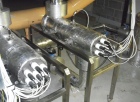The gatekeeper solution to water treatment

Following testing for the NHS on the mains water supply to a community hospital, Rodin’s titanium advanced oxidation process (AOP) for preventing legionella and other bacteria entering the water system of a building has been installed on several other projects by Skanska. They include the Royal London Hospital in Whitechapel, a prison and an MoD establishment.
The Titanium AOP unit produces hydroxyl radicals (OH) that are extremely unstable and aggressive. They react immediately with micro-organisms and other organic contaminants in the water and destroy them by removing hydrogen atoms from them. All byproducts of this process and pollutants are eventually broken down to carbon dioxide, oxygen and water.
The NHS testing included analysing samples from two taps for coliform, e. coli and colony counts at temperatures of 22 and 37°C. Of the two sample points tested at 22 and 37°C, the percentage decrease in colony count was 99.8%, 100%, 99.7% and 100%. The mean reduction for bacterial count at 22 and 37°C was 99.8% and 100%, respectively.
Overall, the bacterial count in the hospital water was reduced by 99.9%, and the AOP was able to deliver clean water into the potable-water system and reduce bacteria within the hospital.








